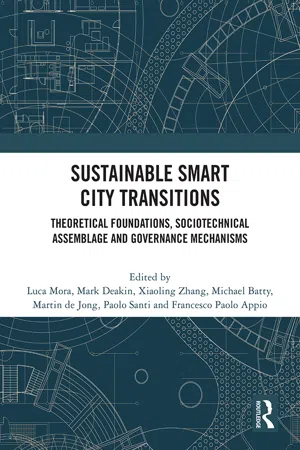
Sustainable Smart City Transitions
Theoretical Foundations, Sociotechnical Assemblage and Governance Mechanisms
- 308 pages
- English
- ePUB (mobile friendly)
- Available on iOS & Android
Sustainable Smart City Transitions
Theoretical Foundations, Sociotechnical Assemblage and Governance Mechanisms
About This Book
This book enhances the reader's understanding of the theoretical foundations, sociotechnical assemblage, and governance mechanisms of sustainable smart city transitions.
Drawing on empirical evidence stemming from existing smart city research, the book begins by advancing a theory of sustainable smart city transitions, which forms bridges between smart city development studies and some of the key assumptions underpinning transition management and system innovation research, human geography, spatial planning, and critical urban scholarship. This interdisciplinary theoretical formulation details how smart city transitions unfold and how they should be conceptualized and enacted in order to be assembled as sustainable developments. The proposed theory of sustainable smart city transitions is then enriched by the findings of investigations into the planning and implementation of smart city transition strategies and projects.
Focusing on different empirical settings, change dimensions, and analytical elements, the attention moves from the sociotechnical requirements of citywide transition pathways to the development of sector-specific smart city projects and technological innovations, in particular in the fields of urban mobility and urban governance.
This book represents a relevant reference work for academic and practitioner audiences, policy makers, and representative of smart city industries.
The chapters in this book were originally published as a special issue of the Journal of Urban Technology.
Frequently asked questions
Information
Mapping the Knowledge Domain of Smart City Development to Urban Sustainability: A Scientometric Study

ABSTRACT
Introduction
We believe a city to be smart when investments in human and social capital and traditional (transport) and modern (ICT) communication infrastructure fuel sustainable economic growth and a high quality of life, with a wise management of natural resources, through participatory governance.
Table of contents
- Cover
- Half-Title Page
- Title Page
- Copyright Page
- Contents
- Citation Information
- Notes on Contributors
- Introduction – Assembling Sustainable Smart City Transitions: An Interdisciplinary Theoretical Perspective
- 1 Mapping the Knowledge Domain of Smart City Development to Urban Sustainability: A Scientometric Study
- 2 From “Smart in the Box” to “Smart in the City”: Rethinking the Socially Sustainable Smart City in Context
- 3 Input-Output Modeling for Smart City Development
- 4 Digital Transformation of City Ecosystems: Platforms Shaping Engagement and Externalities across Vertical Markets
- 5 Strategic Planning for Smart City Development: Assessing Spatial Inequalities in the Basic Service Provision of Metropolitan Cities
- 6 How Are Smart City Concepts and Technologies Perceived and Utilized? A Systematic Geo-Twitter Analysis of Smart Cities in Australia
- 7 Exploring Smart City Project Implementation Risks in the Cities of Kakinada and Kanpur
- 8 Balancing Exploration and Exploitation in Sustainable Urban Innovation: An Ambidexterity Perspective toward Smart Cities
- 9 Quantifying the Spatio-Temporal Potential of Drive-by Sensing in Smart Cities
- 10 Understanding Ridesourcing Mobility and the Future of Electrification: A Comparative Study in Beijing
- 11 The Price of Privacy Control in Mobility Sharing
- 12 Building City Dashboards for Different Types of Users
- 13 Going Beyond the Smart City? Implementing Technopolitical Platforms for Urban Democracy in Madrid and Barcelona
- Index